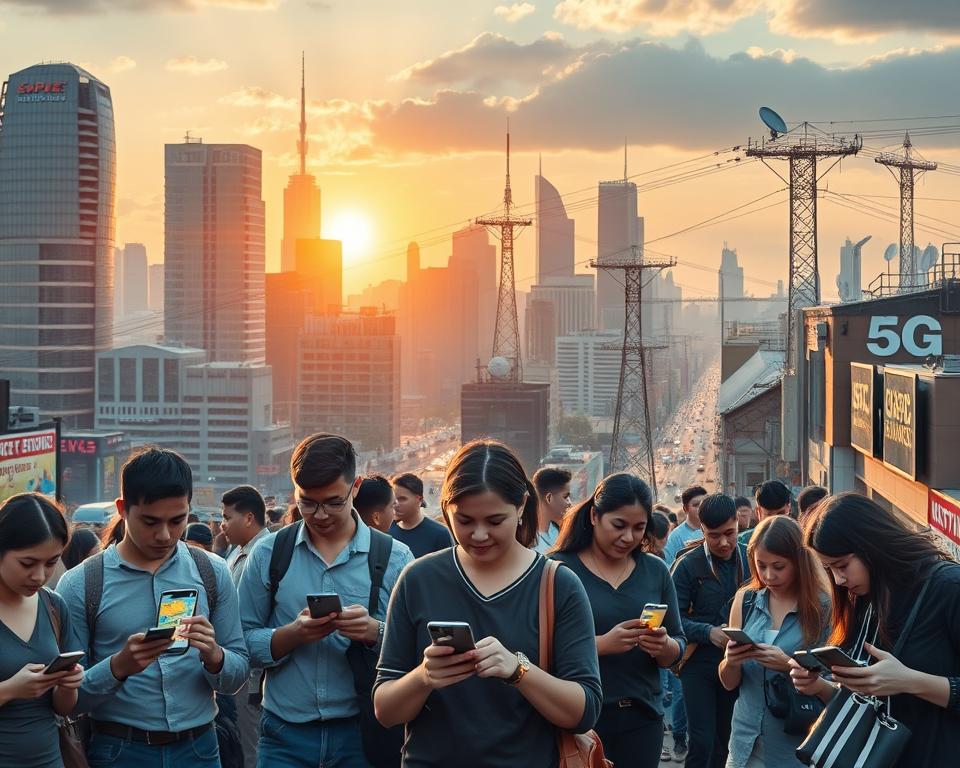
Mobile Tech Unleashed: Uncover the Diverse Uses of This Powerful Tool
Did you know that as of 2023, over 6.8 billion people around the world are using mobile phones? This staggering statistic highlights just how ingrained mobile technology has become in our daily lives. The uses of mobile technology extend far beyond just making calls and sending texts. They have revolutionized how we communicate, work, and even learn. In this article, we will explore the evolution and relevance of mobile technology applications, illustrating how brands like Apple, Samsung, and Google are continuously innovating to enhance the user experience. From healthcare advancements to education solutions, the benefits of mobile technology are vast and impressive, making it an essential tool in contemporary society.

Key Takeaways
- Mobile technology is used by over 6.8 billion people worldwide.
- It has a significant impact on communication, productivity, and education.
- Leading brands continuously innovate to enhance mobile technology applications.
- Mobile technology plays a key role in healthcare and telemedicine.
- Understanding its benefits can greatly improve everyday life experiences.
The Evolution of Mobile Technology
The evolution of mobile technology began in the 1970s with the advent of the first mobile phones, marking a revolutionary step in communication. Companies like Motorola paved the way for mobile devices, creating the first commercial mobile phone. These initial models were bulky and limited in functionality but laid the groundwork for future innovations.
Throughout the 1980s and 1990s, historical advancements in mobile tech saw the introduction of flip phones, which combined portability with style. As technology progressed, consumers welcomed smartphones equipped with touchscreens and internet capabilities. Devices from brands like Nokia became synonymous with reliability and ease of use during this transformative period.
The shift to 3G networks in the early 2000s accelerated the evolution of mobile technology, enabling faster communication and data transfer. This advancement set the stage for 4G networks, further enhancing connectivity and user experience. Today’s smartphones, powered by advanced operating systems such as Android and iOS, exemplify the culmination of these historical advancements in mobile tech.

Current mobile devices continue to adapt and innovate, enabling a multitude of applications that impact both personal and professional lives. The continual evolution of mobile technology ensures that users stay connected and engaged in ways previously unimaginable.
Understanding Mobile Technology Applications
Mobile technology applications represent a diverse range of software designed to enhance user experience on smartphones and tablets. These applications fall into several categories, with the most common being native, web-based, and hybrid apps. Each type serves specific needs and preferences, providing users with tailored experiences that leverage mobile device capabilities.
Application development has transformed dramatically with the rise of platforms like iOS and Android. Developers now have access to powerful tools and resources that enable them to create applications tailored specifically to user demands. The versatility of these platforms allows for a vast range of functionalities, from games to productivity tools, showcasing the extensive potential within the mobile app ecosystem.
The significance of app stores, such as Google Play and the Apple App Store, cannot be overlooked in this discussion. These platforms provide users with a centralized location to access a multitude of applications. Popular apps like TikTok, WhatsApp, and Spotify have made substantial impacts across different industries, highlighting the essential role that mobile technology applications play in daily life.

Uses of Mobile Technology
The transformative impact of mobile technology is evident across numerous sectors, reshaping how we communicate, enhance productivity, and streamline business operations. This dynamic tool has redefined traditional practices, bringing forth innovative solutions tailored to modern demands.
Transforming Communication
Mobile communication tools have revolutionized the way individuals and organizations connect. Applications such as WhatsApp and Slack facilitate instant messaging and real-time collaboration, enabling users to engage effortlessly. Social media platforms amplify voices, bridging geographical gaps and fostering global connections. The seamless access to these mobile communication tools empowers users to communicate effectively, whether in personal or professional scenarios.
Enhancing Productivity
Integrating productivity apps into daily routines significantly boosts efficiency. Tools like Trello and Asana allow users to manage tasks visually, track project progress, and collaborate seamlessly. These productivity apps offer structured environments tailored for planning and execution, ensuring that teams can achieve their objectives while minimizing downtime. The strategic use of these tools contributes to greater focus and organization for both individuals and teams.
Streamlining Business Operations
The uses of mobile technology extend deeply into business management. Companies increasingly utilize integrated mobile solutions such as CRM systems and payment processing applications. These business management apps enable organizations to improve customer relations, manage resources effectively, and streamline operations. By adopting mobile technology, businesses can respond promptly to market changes and enhance operational efficiency, driving growth and customer satisfaction.

| Category | Mobile Tools | Benefits |
|---|---|---|
| Communication | WhatsApp, Slack, Social Media | Instant messaging, global connectivity |
| Productivity | Trello, Asana | Task management, team collaboration |
| Business Operations | CRM Systems, Payment Apps | Enhanced customer relations, efficiency |
Benefits of Mobile Technology for Everyday Life
The benefits of mobile technology are evident in various aspects of our daily lives. With smartphones and tablets, individuals can access a vast array of information from anywhere, fostering a sense of connectivity and immediacy. Families stay in touch effortlessly through messaging apps and video calls, making communication more spontaneous and engaging.
Mobile tech advantages extend beyond mere communication. Applications focusing on wellness, fitness, and finance allow users to manage their daily activities more effectively. From tracking fitness goals to budgeting expenses, mobile devices empower individuals to lead more organized and health-conscious lifestyles.
Statistical data highlights an upward trend in daily life mobile use, showcasing how different demographics utilize their devices. Studies indicate that younger generations rely heavily on mobile technology for education and entertainment, while older adults appreciate it for safety and connectivity. These insights underline the transformative power of mobile devices in shaping our daily routines.

Mobile Technology in Healthcare
Mobile technology in healthcare has emerged as a game changer, enhancing the way patients interact with medical professionals and manage their health. The integration of mobile applications into healthcare systems has facilitated improved patient engagement, making health management more accessible and efficient.
Improving Patient Care
Patient care apps play a crucial role in bridging the communication gap between healthcare providers and patients. Through these applications, patients can easily schedule appointments, access medical records, and receive reminders for medications. For instance, platforms like MyChart have empowered patients by allowing them to manage their health from the convenience of their smartphones, making a significant impact on overall patient satisfaction.
Telemedicine and Remote Monitoring
Telemedicine is revolutionizing access to healthcare services, particularly in remote areas. Companies such as Teladoc and HealthTap are leading the way in providing virtual consultations that allow patients to connect with healthcare professionals without the need for physical appointments. This advancement not only saves time but also enables continuous health monitoring through mobile technology. Patients can track vital signs and share this data with their providers, ensuring proactive and timely interventions that enhance healthcare outcomes.
Mobile Technology in Education
Mobile technology in education has transformed the way students and educators interact with content and each other. This innovation opens doors to various learning opportunities that were not previously possible, making education more accessible and engaging for learners everywhere.
Online Learning Solutions
Online learning apps like Coursera and Khan Academy empower students to access high-quality courses from anywhere with an internet connection. This flexibility allows learners to tailor their education to fit individual schedules. With mobile technology in education, students can participate in lectures, complete assignments, and engage in discussions while on the go. The integration of these platforms has also bridged gaps for those unable to attend traditional classes, fostering a more inclusive learning environment.
Interactive Learning Tools
Incorporating interactive educational tools into the learning process enhances student engagement significantly. Apps such as Quizlet and Duolingo provide gamified experiences that motivate learners to explore topics in a fun and memorable way. Mobile technology facilitates personalized learning paths for students, ensuring that each individual can advance at their own pace. This technology not only makes learning enjoyable but also helps to reinforce concepts through interactive exercises and feedback.
| Feature | Online Learning Apps | Interactive Educational Tools |
|---|---|---|
| Accessibility | Available anywhere, anytime | Engaging and hands-on |
| Customization | Variety of courses and materials | Personalized learning experiences |
| Engagement | Self-paced learning | Motivational game-like environments |
| Feedback | Quizzes and assessments | Instant feedback and rewards |
Mobile Technology Impact on Society
The mobile technology impact on society is profound and multifaceted. Smartphones and other mobile devices have transformed how individuals interact, work, and access information. A significant aspect involves the societal changes due to mobile tech, where communication has evolved from traditional methods to instant messaging and video calls. This shift fosters stronger connections among people, regardless of geographic barriers.
Yet, while mobile technology promotes accessibility and connectivity, it also reveals the challenges of the digital divide. Communities lacking resources or infrastructure face disadvantages, unable to fully engage with the wealth of information and opportunities available online. As mobile tech expands, addressing this divide becomes crucial for ensuring equitable access for all populations, allowing everyone to benefit from technological advancements.
The influence of mobile technology extends to social behavior. Users exhibit shifts in how they spend time, prioritize communication, and engage with media. Cultural shifts arise as mobile technology reshapes norms and values, fostering a new landscape of behavior and interaction. As societies adapt to these changes, the balance between connection and privacy remains a critical conversation in today’s digital age.
Mobile Technology Advantages for Businesses
Businesses today benefit significantly from mobile technology advantages that enhance efficiency and productivity. With the implementation of business mobility solutions, organizations can improve their operational workflows, allowing employees to access critical information from anywhere. This flexibility is crucial in today’s fast-paced market, where remote work has become the norm.
Enterprise mobile strategies are designed to create an environment where teams can collaborate seamlessly. For example, tools like Slack or Microsoft Teams allow employees to communicate and share files in real-time, addressing projects promptly. The integration of mobile applications into daily business operations plays a pivotal role in enhancing customer service and engagement.
Notable companies leverage these mobile solutions to gain a competitive edge. Retail giants utilize mobile purchasing apps to streamline transactions and enhance the shopping experience. Restaurants implement mobile ordering systems, leading to increased efficiency and customer satisfaction. These practical applications underscore the importance of adopting mobile technology in a business context.
With mobile technology at the forefront, companies can foster greater workforce collaboration and boost overall productivity. As more businesses recognize the potential of mobile technology, the shift toward these solutions will continue to grow, setting the stage for innovative changes in the business landscape.
Emerging Mobile Technology Trends
The landscape of mobile technology is constantly evolving, influenced by groundbreaking innovations that redefine user experiences. Comprehensive understanding of emerging mobile technology trends allows businesses and consumers to adapt and thrive in this dynamic environment. Two trends particularly stand out: the rise of 5G connectivity and the integration of artificial intelligence in mobile tech.
5G Connectivity and Its Implications
5G networks deliver unprecedented speeds, significantly enhancing mobile applications and user interactions. This leap in connectivity opens up opportunities for real-time data transfer and more reliable communication. Industries such as entertainment and gaming find themselves reshaped by 5G implications, offering seamless streaming and immersive experiences that were previously unattainable.
Artificial Intelligence in Mobile Tech
The incorporation of AI in mobile tech transforms user experience by personalizing applications and improving responsiveness. From virtual assistants like Siri and Google Assistant to predictive analytics that anticipate user needs, AI enhances mobile functionality. This intelligent integration not only streamlines tasks but also provides insights that improve service delivery across various sectors.
| Trend | Description | Impact |
|---|---|---|
| 5G Connectivity | High-speed mobile internet enabling faster data transfer. | Enhanced user experiences in streaming, gaming, and IoT applications. |
| AI in Mobile Tech | Implementation of intelligent algorithms for personalized experiences. | Improved efficiency and user satisfaction through tailored application interactions. |
The Future of Mobile Technology
The future of mobile technology promises remarkable advancements that will reshape how we interact with the world. As mobile innovation continues to evolve, we can expect significant improvements in areas such as augmented reality (AR), enhancing user experiences in ways previously unseen.
Major technology companies are ramping up investment in research and development, focusing on next-gen mobile trends that prioritize mobile security. Enhanced security measures will become standard, safeguarding user data against increasingly sophisticated cyber threats.
Another exciting aspect of the future of mobile technology includes sustainable practices. Manufacturers are becoming more conscious of their environmental impact, striving for eco-friendly materials and energy-efficient devices that reduce carbon footprints.
The landscape of mobile technology will also see the integration of artificial intelligence, creating smarter devices that learn from user behaviors and preferences. This shift will lead to more personalized experiences tailored to individual needs.
In summary, the future of mobile technology is set to be both innovative and secure, paving the way for a connected world that embraces sustainability and personalization. As we look ahead, the anticipation of mobile innovation keeps the excitement alive for consumers and innovators alike.
Conclusion
As we reflect on the conclusion on uses of mobile technology, it becomes clear that its impact on modern life is profound and far-reaching. From enhancing communication and productivity to revolutionizing sectors like healthcare and education, mobile technology continues to shape how we interact and operate on a daily basis. The integration of advanced features, such as telemedicine and interactive learning tools, showcases the versatility and necessity of mobile tech today.
This mobile tech summary highlights the need for individuals and businesses to stay informed and adaptable. As innovation accelerates, understanding the evolving trends allows us to harness the benefits of mobile technologies while maintaining responsible usage. Being aware of advancements not only maximizes potential but also ensures that we can navigate the complexities of a tech-driven world.
Ultimately, the impact of mobile technology is not merely about convenience; it influences how we connect, learn, and grow in a rapidly changing environment. Embracing these innovations with a mindful approach will pave the way for a future where technology enhances our lives while respecting the balance of ethical considerations.



